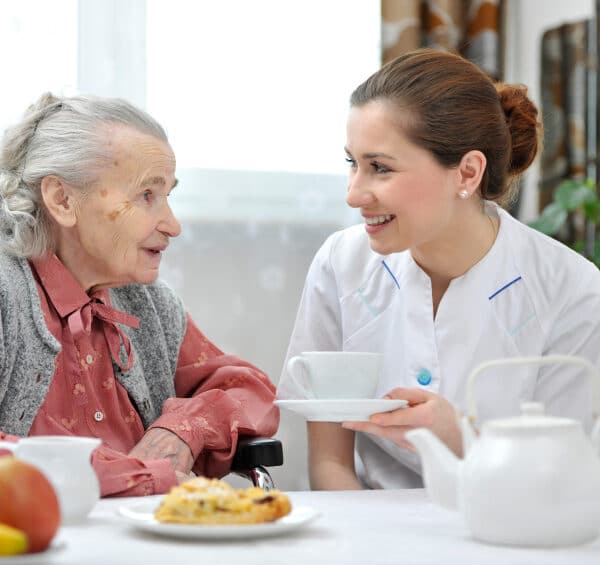
A CQC inspector described what the new CQC regulations will mean for care home caterers in a key presentation at the Annual Training and Development Forum hosted by The National Association of Care Catering (NACC). This talk was featured in a recent review by Jane Renton in the magazine Care Home Catering, and is the subject of this month’s article.
CQC inspector comments on new CQC regulations for nutrition in care homes
The CQC, as readers are aware, is the independent regulator of health and social care in England. At the forum, the inspector Janie Buchanan explained the impact of the new CQC regulations for care home caterers. She described food and hydration as critical in care homes and noted that too many were still failing in their statutory duty to provide it adequately.
The inspector also commented that appropriate food and drink is not just about providing nutrients for the health and wellbeing of service users, but often has an important psychosocial function – that it could be the highlight of a long, and perhaps dull day in a residential home.
The CQC’s new, more intensive approach to adult care inspections, launched in October 2014, followed heavy criticism of the way the Commission had undertaken past inspections, some of them in homes where residents had been subsequently abused by staff or failed to be adequately cared for. The Francis Report into the Mid-Staffs scandal had also placed pressure on the organisation to revise its previous practice.
Previously, services had been deemed either compliant or non-compliant with 28 regulations, but that didn’t differentiate those homes with really outstanding service from those that simply passed the tests in question. The inspector reported that new CQC inspections will be longer and more thorough. They will include more specialist teams, with inspectors placing a far greater emphasis on looking at the views of people using the service, the interaction between staff and service users, and questioning whether service users really receive person-centred care.
Provision of adequate nutrition and hydration is mandatory
Janie Buchanan reflected on the legislation prior to the new CQC regulations with regards to the provision of adequate nutrition and hydration in care homes. This included the statutory requirement under regulation 14 of the Health and Social Care Act 2008 and the Regulated Activities Regulations 2010 to make certain that the registered person ensures that service users are protected from the risks of inadequate nutrition and dehydration. However, fairly recent CQC inspections carried out on all care establishments have revealed non-compliancy in a minority of cases, with inspections in 2013 revealing that nearly per cent, or 321 of the 4,393 establishments inspected had failed to meet this basic legal requirement. It is not acceptable that people in care are not getting adequate hydration and nutrition.
The inspector referred to some of her personal insights into nutrition in care homes. She referred to the practice in some of these care homes of giving residents jam sandwiches and cornflakes every morning, and often jam sandwiches in the evening, or care homes that didn’t provide proper dining space or even tables at which to eat. In some cases, the inspector noted, staff are not offering encouragement or an alternative to people who have not eaten their meal that day and are not supporting people who struggle to eat, often putting food and drink out of their reach.
Nutrition care plans are a key source of evidence for inspectors
The inspector highlighted that some care homes were failing to keep proper records and that it is critical for them to ensure that appropriate care plans for individual residents are in place. She advised that this may well be an area that inspectors will particularly focus on. Food preferences and dislikes need to be recorded and adhered to, along with any nutritional risks, and weight needs to be recorded and monitored.
Staff hygiene in respect to preparation and service of food is another aspect that the CQC will be monitoring. For example, did staff wash their hands before serving meals? The environment where meals are eaten will also be an important consideration. The inspector reflected on experiences where she had eaten in homes in which the environment was not pleasant or conducive to a good quality mealtime experience – where the TV may be on, cleaning and hovering taking place and staff shouting to each other. Residents need to be given sufficient time to eat and, if feasible, the right equipment utilised to help them eat independently. But where help is needed, staff should be sensitive and not, as she had recently witnessed in one case, put on blue plastic gloves to feed an elderly patient. The inspector felt that this was somewhat clinical and alienating. Service users’ dignity should be respected, for example, if residents have difficulty in cutting up their food, this should be done discreetly in the kitchen rather than publicly in front of everyone in the dining room.
Nutrition in patients with dementia should be recognised
In her presentation, Janie Buchanan reflected particularly on issues concerning people with dementia. She advised that people with dementia should be seated at the table last and served first, and pictorial menus may be more appropriate in such circumstances than written ones. She also strongly recommended that those involved in food service should engage residents as much as possible. Examples of good practice include getting them involved in preparing the food they are going to eat, peeling potatoes, setting tables, washing dishes, folding napkins, clearing tables. To illustrate her point on engaging the service user with mealtimes, the inspector recollected one visit to a home that had coincided with a Burns Supper, where haggis, neeps and tatties had been served, with staff dressing up appropriately. Not only did the residents love it – but that home got a very good rating.



